Daily Vulnerability Trends: Mon Jul 17 2023

| CVE NAME | CVE Description |
| CVE-2023-26512 | No description provided |
| CVE-2023-29298 | Adobe ColdFusion versions 2018u16 (and earlier), 2021u6 (and earlier) and 2023.0.0.330468 (and earlier) are affected by an Improper Access Control vulnerability that could result in a Security feature bypass. An attacker could leverage this vulnerability to access the administration CFM and CFC endpoints. Exploitation of this issue does not require user interaction. |
| CVE-2023-35829 | An issue was discovered in the Linux kernel before 6.3.2. A use-after-free was found in rkvdec_remove in drivers/staging/media/rkvdec/rkvdec.c. |
| CVE-2023-37582 | The RocketMQ NameServer component still has a remote command execution vulnerability as the CVE-2023-33246 issue was not completely fixed in version 5.1.1. When NameServer address are leaked on the extranet and lack permission verification, an attacker can exploit this vulnerability by using the update configuration function on the NameServer component to execute commands as the system users that RocketMQ is running as. It is recommended for users to upgrade their NameServer version to 5.1.2 or above for RocketMQ 5.x or 4.9.7 or above for RocketMQ 4.x to prevent these attacks. |
| CVE-2023-27997 | A heap-based buffer overflow vulnerability [CWE-122] in FortiOS version 7.2.4 and below, version 7.0.11 and below, version 6.4.12 and below, version 6.0.16 and below and FortiProxy version 7.2.3 and below, version 7.0.9 and below, version 2.0.12 and below, version 1.2 all versions, version 1.1 all versions SSL-VPN may allow a remote attacker to execute arbitrary code or commands via specifically crafted requests. |
| CVE-2023-33246 | For RocketMQ versions 5.1.0 and below, under certain conditions, there is a risk of remote command execution. Several components of RocketMQ, including NameServer, Broker, and Controller, are leaked on the extranet and lack permission verification, an attacker can exploit this vulnerability by using the update configuration function to execute commands as the system users that RocketMQ is running as. Additionally, an attacker can achieve the same effect by forging the RocketMQ protocol content. To prevent these attacks, users are recommended to upgrade to version 5.1.1 or above for using RocketMQ 5.x or 4.9.6 or above for using RocketMQ 4.x . |
| CVE-2023-35036 | In Progress MOVEit Transfer before 2021.0.7 (13.0.7), 2021.1.5 (13.1.5), 2022.0.5 (14.0.5), 2022.1.6 (14.1.6), and 2023.0.2 (15.0.2), SQL injection vulnerabilities have been found in the MOVEit Transfer web application that could allow an unauthenticated attacker to gain unauthorized access to MOVEit Transfer’s database. An attacker could submit a crafted payload to a MOVEit Transfer application endpoint that could result in modification and disclosure of MOVEit database content. |
| CVE-2023-37466 | vm2 is an advanced vm/sandbox for Node.js. The library contains critical security issues and should not be used for production. The maintenance of the project has been discontinued. In vm2 for versions up to 3.9.19, `Promise` handler sanitization can be bypassed with `@@species` accessor property allowing attackers to escape the sandbox and run arbitrary code. Remote Code Execution, assuming the attacker has arbitrary code execution primitive inside the context of vm2 sandbox. |
| CVE-2023-3595 | Where this vulnerability exists in the Rockwell Automation 1756 EN2* and 1756 EN3* ControlLogix communication products, it could allow a malicious user to perform remote code execution with persistence on the target system through maliciously crafted CIP messages. This includes the ability to modify, deny, and exfiltrate data passing through the device. |
| CVE-2023-37450 | No description provided |
| CVE-2023-28121 | An issue in WooCommerce Payments plugin for WordPress (versions 5.6.1 and lower) allows an unauthenticated attacker to send requests on behalf of an elevated user, like administrator. This allows a remote, unauthenticated attacker to gain admin access on a site that has the affected version of the plugin activated. |
| CVE-2018-13379 | An Improper Limitation of a Pathname to a Restricted Directory (“Path Traversal”) in Fortinet FortiOS 6.0.0 to 6.0.4, 5.6.3 to 5.6.7 and 5.4.6 to 5.4.12 and FortiProxy 2.0.0, 1.2.0 to 1.2.8, 1.1.0 to 1.1.6, 1.0.0 to 1.0.7 under SSL VPN web portal allows an unauthenticated attacker to download system files via special crafted HTTP resource requests. |
| CVE-2023-36884 | Microsoft is investigating reports of a series of remote code execution vulnerabilities impacting Windows and Office products. Microsoft is aware of targeted attacks that attempt to exploit these vulnerabilities by using specially-crafted Microsoft Office documents. An attacker could create a specially crafted Microsoft Office document that enables them to perform remote code execution in the context of the victim. However, an attacker would have to convince the victim to open the malicious file. Upon completion of this investigation, Microsoft will take the appropriate action to help protect our customers. This might include providing a security update through our monthly release process or providing an out-of-cycle security update, depending on customer needs. Please see the Microsoft Threat Intelligence Blog https://aka.ms/Storm-0978 Entry for important information about steps you can take to protect your system from this vulnerability. This CVE will be updated with new information and links to security updates when they become available. |
| CVE-2023-35708 | In Progress MOVEit Transfer before 2021.0.8 (13.0.8), 2021.1.6 (13.1.6), 2022.0.6 (14.0.6), 2022.1.7 (14.1.7), and 2023.0.3 (15.0.3), a SQL injection vulnerability has been identified in the MOVEit Transfer web application that could allow an unauthenticated attacker to gain unauthorized access to MOVEit Transfer’s database. An attacker could submit a crafted payload to a MOVEit Transfer application endpoint that could result in modification and disclosure of MOVEit database content. These are fixed versions of the DLL drop-in: 2020.1.10 (12.1.10), 2021.0.8 (13.0.8), 2021.1.6 (13.1.6), 2022.0.6 (14.0.6), 2022.1.7 (14.1.7), and 2023.0.3 (15.0.3). |
| CVE-2023-0386 | A flaw was found in the Linux kernel, where unauthorized access to the execution of the setuid file with capabilities was found in the Linux kernel’s OverlayFS subsystem in how a user copies a capable file from a nosuid mount into another mount. This uid mapping bug allows a local user to escalate their privileges on the system. |
A considerable amount of time and effort goes into maintaining this website, creating backend automation and creating new features and content for you to make actionable intelligence decisions. Everyone that supports the site helps enable new functionality.
If you like the site, please support us on “Patreon” or “Buy Me A Coffee” using the buttons below
To keep up to date follow us on the below channels.

![[RHYSIDA] - Ransomware Victim: Acos Favorit 2 image](https://www.redpacketsecurity.com/wp-content/uploads/2024/09/image-300x300.png)
